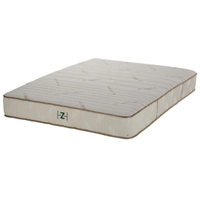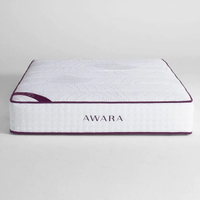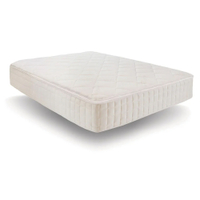Are organic mattresses a con? An expert talks 'green washing' in the organic bed market
Naturepedic's Arin Schultz weighs in on 'green' mattress claims and how to know if your organic bed is what it claims to be.

We're all on the quest for better sleep, but we don't want it to come at the expense of the environment or our health. To meet this growing demand, the organic mattress industry has exploded, with many of the best mattresses boasting impressive 'green' credentials. But are organic mattresses just one big con?
To get to the bottom of these 'natural' mattress claims, we spoke to Arin Schultz, VP of Sales and Marketing at EWG-verified sleep brand Naturepedic. His advice? You can find an organic mattress that's as good for your sleep as it is for the planet, but do your research and steer clear of buzzwords with nothing to back them.
“There’s certain words that we don’t use in our marketing, like 'green', 'eco', 'natural'... We never go near these words because they mean nothing," says Schultz. "Green is a color – it means nothing."
Here's the lowdown on how to navigate green mattress claims and what to look for to find organic bed brands you can trust.
Are organic mattresses just a con?
Organic mattresses aren't just a con, and the right organic bed can offer a sleep solution that's good for both you and the environment. However, while terms such as 'organic', 'natural', and 'green' are often used interchangeably, they don't always mean the same thing – and it isn't always made clear to the consumer why a mattress might be considered 'green'.
For the best organic mattresses to be certified organic they must be made with natural materials that meet stringent sourcing and manufacturing requirements. Third-party verifications and certifications help consumers identify these sleep brands. And as many certifications require periodic retesting, you can rest assured that these organic claims are under consistent scrutiny.

However, terms such as 'green', 'eco' and 'natural' might sound environmentally promising, but ultimately mean nothing if they aren't backed up by proper industry verifications.
Sign up to get the BEST of Tom's Guide direct to your inbox.
Get instant access to breaking news, the hottest reviews, great deals and helpful tips.
"The verifications and the certifications, that’s what matters to a product,” says Schultz. Although, even Schultz admits that a verification doesn't mean much if it doesn't come from a reputable source. "It’s just a matter of doing research.”
So while organic mattresses aren't a con, organic doesn't always mean, well... organic. A natural mattress might have been independently testified and verified organic, but it can sometimes mean a brand wanted to jump on a trend. The hard part is figuring out which is which.
Why are organic mattresses so popular?
As consumers become more aware of how their purchasing choices impact the world and their wellbeing, organic mattresses are becoming increasingly popular. According to Schultz, there are over "100 potential chemicals" in a standard mattress, many of which the Environmental Working Group describe as "harmful to health and the environment". For more information about the chemicals potentially used in mattress, take a look at the EWG licensing guidelines.
"Consumers are getting a lot more educated," says Schultz. "I hate to use the word 'movement' but there’s definitely been a movement, especially in the last decade... Customers are willing to make an investment [in an organic mattress] because you spend a third of your life in bed."

And Schultz believes this growth will continue as people learn more about organic mattress. "It's all about education. Not every consumer is aware of why organic, sometimes you get into that shtick of, 'it's organic, they're just trying to charge me more because of XYZ'. But there's a real science behind it in terms of the materials that we have."
However, the increasing interest in an organic sleep options has led to less reputable brands trying to capitalize on the trend. Some sleep manufacturers emphasize 'green' and 'natural' while providing limited explanation of how they attained these labels – and this 'green-washing' makes it harder for the consumer to choose a bed that really is better for the environment.
How to spot a fake organic mattress
If you're thinking about buying an organic mattress, the good news is that they are becoming more accessible. However, the downside of the growing trend is that it's harder to separate genuine organic beds from their green-washed counterparts. Here's what to look for (and what to avoid) when buying an organic mattress...
1. There's no verification or certification
The best way to understand the validity of a sleep brand's organic claims is to check for certification. Certification and verification from recognized organizations offer a reassurance of quality and can help you understand exactly what materials are inside your bed.
"Consumers should be mindful of any vague language surrounding sustainability. Language such as 'green' and 'eco-friendly,' or 'all-natural ingredients' are the most common and often just marketing words, nothing more," explains Schultz.
"In the industry, we call this practice 'greenwashing,' which refers to when companies use misleading claims to describe how environmentally friendly their products/services are. My advice to consumers would be to do your research ahead of time. Look for those certifications."
Check for reputable sources such as GOTS (Global Organic Textile Standard), GOLS (Global Organic Latex Standard), and EWG (Environmental Working Group), with established testing practices. They can help you determine if, for example, your latex mattress is synthetic latex vs all-natural latex. Our guide to non-toxic mattresses can help you learn more.
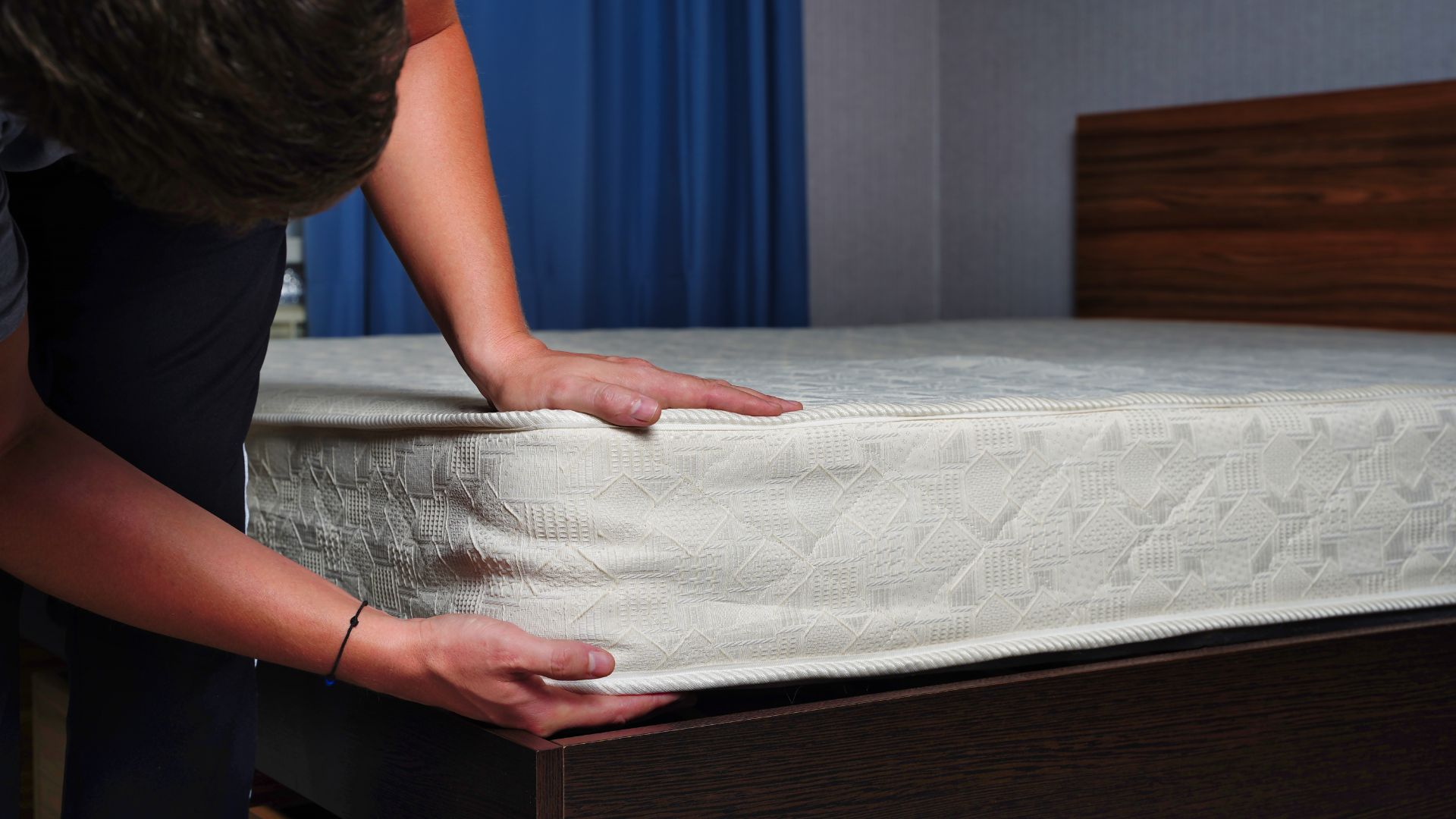
2. The labelling is unclear and hard to find
Is a mattress claiming to be green but the brand doesn't provide information about where and how materials are sourced? Do you have to search the website to find exactly what's used in a so-called 'natural' mattress? Then be careful, as the bed might not be genuinely organic.
Most organic brands are proud to show off their certification and materials because they are so hard-won. If the information isn't easy to find, it's likely that a 'natural' claim can't be backed up by an independent tester.
3. Materials are buried using appealing terms
Take a look through the material list of a mattress and you might come across phrases such as 'glass wool', 'silica' and 'glass fiber'. They might not ding your radar at first – sleep brands use a lot of strange terminology – but these are burying words, used to disguise that a mattress contains potentially-harmful fiberglass.
If you're wondering how to know if your mattress contains fiberglass, there's one big clue: fiberglass-free mattress brands like to brag about it. Sleep brands that don't use fiberglass tend to shout it from the rooftops, while mattresses with fiberglass can be a little more coy about their materials.
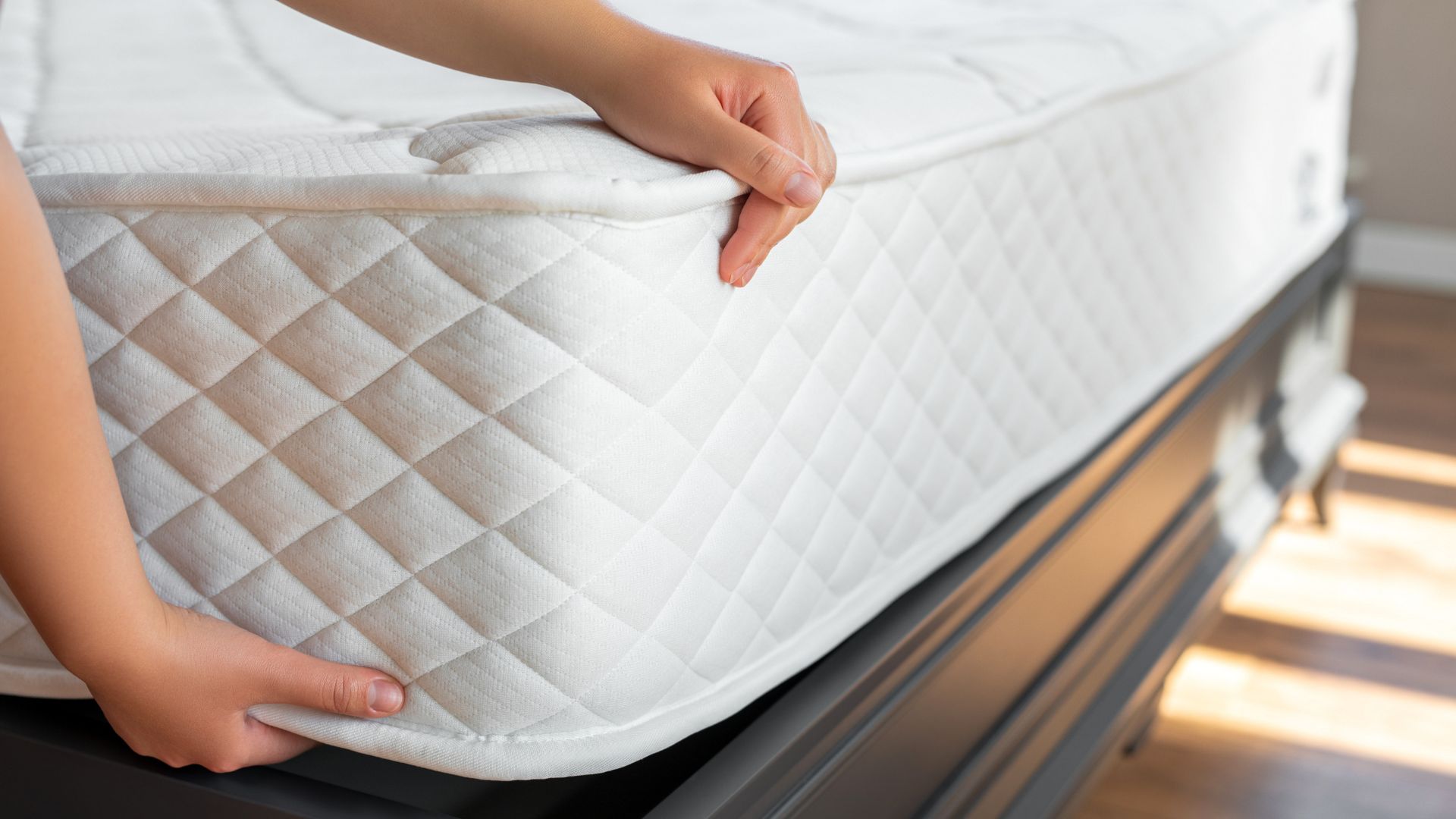
4. The mattress has a strong off-gassing smell
Mattress off-gassing is the chemical smell that occurs when your mattress in a box is unfurled. It can linger anywhere from an hour or less to a few days, and while it's mostly harmless, it can cause mild, temporary irritation for some people.
"That smell after it gets unrolled, it can irritate your throat, and you can have nose issues and everything for a number of days afterwards," Schultz says. "And that's all from those chemicals from the mattress that you're breathing in."
However, that doesn't mean your organic mattress is going to be scent-free. Popular organic materials such as latex and wool can both give off a smell, but it's less chemical than that of foam off-gassing.
5. The bed is surprisingly cheap
There's no way around it – a true organic bed is going to be an expensive purchase. Some of the best luxury mattresses are organic, as the cost of correctly sourcing and verifying materials tends to bump the price up. If the price of an organic mattress looks too good to be true, it probably is.
While organic mattresses tend to be premium buys, they often have fantastic durability, so your expensive bed should last a while. And the good news is that as organic mattresses become more popular, they also become more affordable – we expect to see some savings in the upcoming Memorial Day mattress sales.
Although organic mattresses are typically more expensive, we are seeing brands buck that trend. Take the Avocado Eco Organic Mattress. This has a starting MSRP of $777 for a twin, and you can often buy a queen Avocado Eco Organic Mattress for just $1,169 at Avocado. And as the demand for organic beds grows, we hope to see more budget-friendly organic beds on the market.
3 organic mattresses you can trust
1. Saatva Zenhaven Latex Mattress: from $1,995 $1,770 at Saatva
The Saatva Zenhaven Latex Mattress has been certified by GOTS, GOLS, eco-INSTITUT, and GREENGUARD Gold – plus it has the Congress of Chiropractic State Association Seal of Approval. Ideal for back pain sufferers who want an organic bed with pressure relieving support, you can save $350 on a queen in the current Saatva mattress sale.
2. Awara Natural Hybrid Mattress: from $1,299 $649 at Awara Sleep
One of the most affordable eco-friendly beds on the market, our Awara Natural Hybrid Mattress review found it had an excellent build quality with a feel to suit a range of sleep styles. The 20% off spring sale is an evergreen deal, but this is still an incredible price for an organic bed. However, if you can wait a little longer, we expect a bigger discount for Memorial Day.
3. Naturepedic Serenade Organic Hybrid Mattress: from $1,399 $1,189.15 with code EARTH15 at Naturepedic
The most affordable bed in Naturepedic's luxury organic range, the Serenade Organic Hybrid Mattress uses latex, wool, and cotton – combined with supportive springs – to balance an eco-friendly design with sleep comfort. To celebrate Earth Month, Naturepedic is offering 15% off the serenade with code EARTH15, taking a queen down to $1,699.15

Ruth is a staff writer at Tom’s Guide, covering all things mattress and sleep. She has a deep interest in the link between sleep and health, and has tried enough mattresses to know the right bed really can make a difference to your wellbeing. At Tom’s Guide she writes to help people sleep better, from how-tos to the latest deals to mattress reviews, and has interviewed an array of specialists who share her passion. Before joining the team at Tom’s Guide, Ruth worked as a sleep and mattress writer for our sister website, TechRadar.
